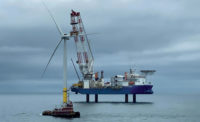Clean Energy Manufacturing
Work Starts on $2B West Virginia Hydrogen Plant to Power Data Megasite

Planned $2B West Virginia complex is set to include four blue hydrogen production plants using biomass and natural gas to power an associated data center megasite.
Image: Fidelis New Energy
Houston-based Fidelis New Energy has started development and launched permitting for a $2-billion hydrogen production plant in West Virginia. It will power an associated data center megasite as well as industrial manufacturers, transportation companies and utilities. The energy company said the Mountaineer GigaSystem in Mason County would produce blue hydrogen from natural gas and store CO2 emissions underground on state-owned property, with its first phase to open in 2028.
Fidelis has finalized with state officials an operating agreement for sequestration pore space and targeted storage capacity. It selected Battelle Carbon Services in early September to drill and collect test well data and submit sequestration permit applications, and has a letter of intent with Babcock & Wilcox to evaluate, develop and deliver four hydrogen production plants at the site using biomass and natural gas.
Each plant would produce 500 metric tons per day of net-zero carbon hydrogen, using Fidelis' proprietary technology that allows hydrogen production with zero lifecycle carbon emissions from a combination of natural gas, renewable energy and carbon capture and sequestration, the company said. The hydrogen would also be used for transportation and steel production. Waste heat and captured carbon dioxide would power greenhouses for food production.
“By combining several proven technologies from leading providers including Topsoe and B&W, we are able to produce lifecycle carbon-free clean hydrogen at scale without taking new technology risk,” said Bengt Jarlsjo, president and COO. He and CEO Daniel Shapiro, company co-founders, are also management veterans of Quanta Services.
Under its state agreement, the firm will receive $62.5 million in forgivable state loans, including $25 million for preconstruction that involves obtaining permits and drilling sequestration wells. It would be forgiven if the activity was finished in three years. The remaining $37.5 million would be forgiven if the project meets certain employment and investment commitments.
John Musgrave, executive director of the Mason County Development Authority, said the four-phase development will create 4,200 construction jobs and 800 full-time jobs.
Data centers at an adjacent megasite called Monarch Cloud Campus will use several other Fidelis technologies. The firm will spend an estimated $5 billion more to build out the data center site that would use about 1,000 MW of power, it said.
Fidelis is a partner in the Appalachian Regional Clean Hydrogen Hub, which links private industry, state and local governments, academic institutions and technology firms to vie for funding as part of the U.S. Energy Dept.'s planned national clean hydrogen network. DOE will select six to ten hydrogen hubs this fall to receive support from a $7-billion program funded through the 2021 infrastructure law.
The hubs are meant to demonstrate production, processing, delivery, storage and end use of clean hydrogen. Developers of each hub must fund at least 50% of its estimated cost, which ranges from $800 million to $2.5 billion. The federal award includes support for planning, development and construction of the hub and two to four years of operations
But a coalition of 17 state and national project opponents said in an August letter to the U.S. Environmental Protection Agency that they are skeptical of the carbon capture and storage technology and of West Virginia's ability to safely oversee its implementation. They want EPA to reject a state request to regulate wells to be used for carbon injection.





